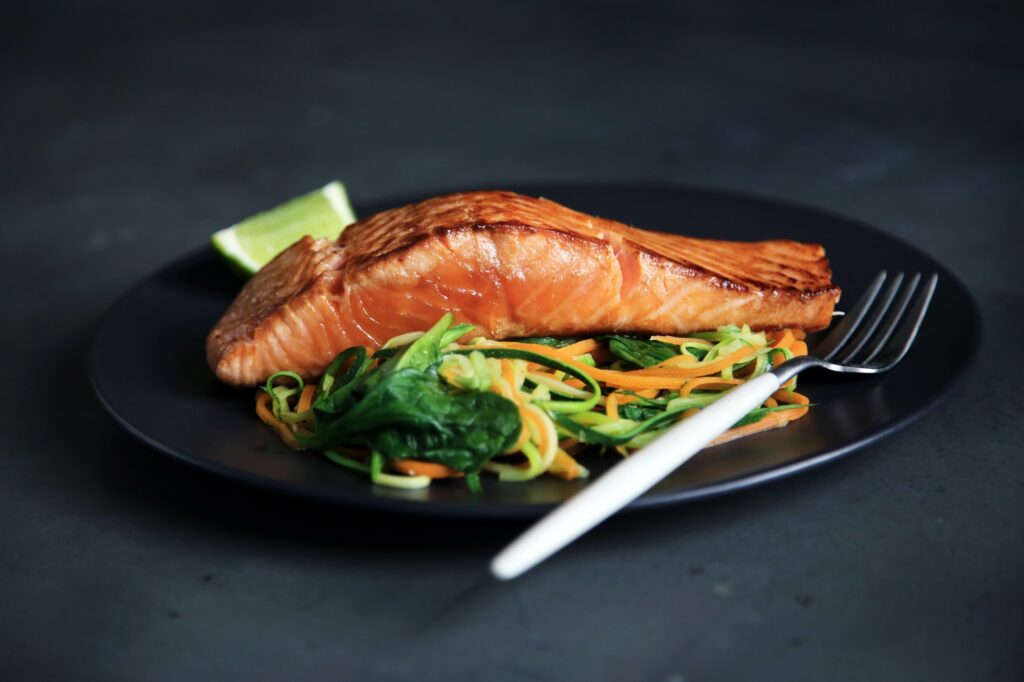Last Updated on October 6, 2025 by Kayla
Table of Contents
- How to prepare for your first intermittent fast
- How to break your first fast
- How long should I fast for?
- When to stop fasting
How to prepare for your first intermittent fast
If you are new to intermittent fasting {AKA “taking a break from food” for 12-24 hours}, the idea of starting can be intimidating. Below are some of my favorite tips for easing into a flexible intermittent fasting routine that works for you.
Ease in
If you’ve never fasted before, it can be a little nerve-wracking. Try fasting 2-3 days of the week to start. You can also ease your way into timed eating by limiting snacks between meals and sticking to three meals per day. Once you are comfortable with that, skip breakfast, and wa-laa – you’re fasting!
One of the most common intermittent routines is 16:8, which refers to 16 hours fasting and eating within an 8-hour eating window. To learn about the types of intermittent fasting, you can read more here.
Recognize that there is no perfect way to fast and that fasting looks different for everyone. What’s important is that you find what works best for YOU! The best intermittent fasting protocol is one that you stick to!

Have an open mind
Mindset is a significant factor in whether or not you fast comfortably. Don’t be too critical of yourself and approach fasting with a positive mindset. Be open to new experiences and tune into your body’s signals. Taking a temporary break from food can help reconnect with hunger cues and notice what foods make you feel best.
Practice mindfulness by meditating, journaling, or yoga, which help tune into your body. Distinguish true hunger from “head” hunger, or cravings, by listening to your body’s signals. It takes time and becomes more comfortable with time. Be patient and give yourself some grace along the way.
Ditch the “last supper” mindset
If we aren’t perfect on day one, we get discouraged and quit – especially when it comes to dieting and lifestyle change. Intermittent fasting is a lifestyle and takes time to adapt to. Don’t expect to be perfect at it. It takes time, practice, and patience.
It’s a natural tendency to want to eat yourself through the pantry or refrigerator the night before starting a new nutrition plan. Don’t do this – please don’t do this. It’s not that you’ll never have ice cream, chips, and chocolate ever again. Intermittent fasting provides structure to allow you to indulge in these foods without having the guilt that follows.
The reality is that setbacks happen, and ultimately the goal is to have them happen less often. So don’t eat all the ice cream the night before you practice with intermittent fasting so that it’s not there when you start fresh the next day. There are no foods that are off-limits.
If you can, avoid or limit alcohol and highly processed carbs the night before you experiment with intermittent fasting. Highly processed carbohydrates and alcohol can make your first day of fasting more challenging by wreaking havoc on your blood sugar levels. This can result in poor quality sleep and increased hunger which doesn’t set you up for success.
Stay hydrated
Thirst can be misinterpreted as hunger when we’re not adequately hydrated. Aim to consume at least 64 ounces of plain water, herbal tea, and/or coffee. Whether you choose to “clean” or “dirty” fast, drinks allowed during a fast may vary.
Recognize that hunger comes in waves. So drink a glass of water and distract yourself for a few moments, and before you know it, one or two hours will pass.
Avoid intense exercise
Choose low-intensity physical activity such as strength training, yoga, and walking. Too much or too intense exercise can increase appetite and make intermittent fasting more difficult. If you can flex your exercise schedule, try to workout fasted, if it’s comfortable, right before your first meal.
Weight training helps minimize muscle loss resulting from weight loss. So when you are ready to bring exercise into your routine, strength training should be at the top of the list.

How to break your first fast
If you are new to intermittent fasting, I don’t recommend overhauling your entire diet. Instead, eat the foods you usually would and tune in to your hunger and fullness signals. Do not use intermittent fasting as an excuse to gorge the minute your eating window opens.
First, work on meal timing. Once you are comfortable with that, you can focus on diet quality. I have a grocery list of blood sugar and insulin-friendly foods which can help guide you in the right direction. Aim for 80% of what goes in your mouth to be from the “Foods to Favor” list and, for the remaining 20%, no food is off-limits.
Be sure to include plenty of healthy fats throughout your eating window to help curb hunger and keep you feeling satisfied.
How long should I fast for?
The best intermittent fasting schedule is the one that works best for you. Remember, make intermittent fasting work for you, not against you.
While intermittent fasting is safe for the general population, I recommend reading more about the different types of intermittent fasting and whether or not timed eating is safe for you.
When to stop fasting
Intermittent fasting should not to be miserable. However, while many people experience increased energy and mental focus, it’s not all rainbows and butterflies.
Yes, it’s true. You might experience waves of hunger or headaches. You know your body best, and if you feel that something isn’t right, stop your fast. It will be OK. The world won’t end. Some days are more challenging than others, and that is normal!
How did you begin intermittent fasting? What tips and tricks worked best for you? I would love to hear from you in the comments below!
Helping women lose weight without eating “perfect.” Learn how to balance blood sugar, build strength & overcome all-or-nothing thinking! Apply to learn more!
The posts on my website may contain affiliate links. When you make a purchase through any of the links, there is no additional cost to you, and I may earn a small (and very appreciated) commission. Thank you for your support!


